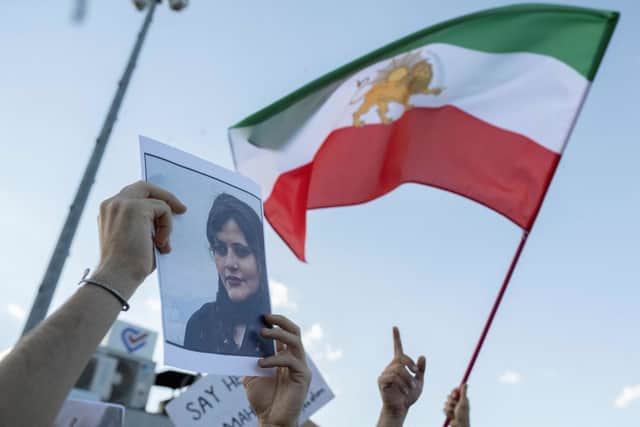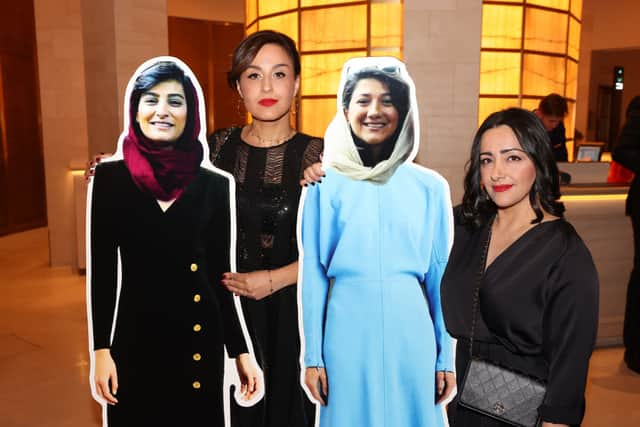Iran protests: two female journalists face death penalty over reporting of Mahsa Amini’s death
and live on Freeview channel 276
Two female journalists are currently on trial in Iran and could face the death penalty over their reporting of the death of Mahsa Amini.
Niloofar Hamedi and Elaheh Mohammadi were among the first to report the tragic story of 22-year Mahsa Amini, who in September 2022 died in the custody of Iran’s ‘morality police’ just three days after she was detained for allegedly failing to wear her hijab properly. Protests broke out in response, with Iranians taking to the streets across the country in an outcry against the government’s treatment of women and its increasingly brutal tactics.
Advertisement
Hide AdAdvertisement
Hide AdThe unrest has continued in Iran ever since, but the country’s regime has violently cracked down on protesters - with estimates in January reporting that 750 Iranians, including children, have been killed during demonstrations and more than 30,000 have been arrested.
Iran has also carried out four state executions of those allegedly involved in protests, with Mohsen Shekari, Majidreza Rahnavard, Mohammad Mehdi Karami, and Seyed Mohammad Hosseini among those known to have been publicly hanged.
Ms Hamedi and Ms Mohammadi were arrested in the days immediately following their reporting of Ms Amini’s death, accused by the Islamic Revolutionary Guard Corps of ‘conspiring with hostile foreign powers’ - a charge that potentially carries the death penalty. The journalists were taken into custody on 22 and 29 September respectively and have been detained in two of Iran’s most notorious prisons ever since.


Critics of the regime say Ms Hamedi’s arrest was punishment for publishing a photograph of the father and grandmother of Ms Amini hugging in Kasra Hospital in Tehran after her death. “The black dress of mourning has become our national flag,” the 30-year-old, who works for the newspaper Shargh, wrote alongside the image - just six days before she was arrested.
Advertisement
Hide AdAdvertisement
Hide AdMeanwhile, it is believed that Ms Mohammadi was arrested for an article she wrote for the newspaper Hammihan reporting on Ms Amini’s funeral in her hometown of Saqqez, in the western province of Kurdistan.
Ms Mohammadi began the piece with a quote from Ms Amini’s father , writing: “Mahsa had no underlying health conditions. Whoever says that is lying.” She then went on to describe the grief of the 1,000 men and women who attended the funeral, reporting how the mourners cried out ‘woman, life, freedom’. In the days after the article’s publication, security forces raided the 35-year-old’s home, seized her electronic devices, and took her into custody.
Ms Mohammadi’s trial began on Monday (29 May) and Ms Hamedi’s begins later on Tuesday (30 May). The two journalists’ husbands have protested at length against their imprisonment and campaigned for their trials to be held in public.


Saeed Parsaei, who is married to Ms Mohammadi, told the reformist newspaper Etemaad: “At the personal and policy level the main question from our perspective is why these two people were arrested for performing their professional and legal duties.”
Advertisement
Hide AdAdvertisement
Hide AdSpeaking previously ahead of her trial, he said: “Why should the judicial system worry about the court being held in public? If there is no proof and documents, the secrecy of the court does not help its acceptance by the society and only adds to the scope of mistrust.”
Mohammad Hossein Ajorlou, who is married to Ms Hamedi, warned that access to lawyers had been restricted as he too insisted the trial should be held in public, saying it is part of his country’s constitution. He also recalled that his wife had said to him: “More than all solitary confinement and prison, my heart broke when I heard my accusation. I love so many Iranians and everything I did was for Iran, yet they accused me of collaborating with hostile powers.”
In a statement published in October, Iran’s ministry of intelligence and its Islamic Revolutionary Guards Corps claimed to have exposed a giant CIA conspiracy to undermine Iran, alleging that the two women had been on CIA or US State Department-controlled training courses overseas.
Ms Hamedi and Ms Mohammadi have long been well-known for their on-the-ground and often hard-hitting reporting of human rights issues and social affairs in Iran.
Advertisement
Hide AdAdvertisement
Hide AdSina Ghanbarpour, a fellow Iranian journalist, told the BBC: “[Niloufar Hamedi] was often the first reporter to break a story. So when Mahsa Amini was arrested by the morality police officers, it was no surprise that I first read about it in a report by [her].”
Since their arrests, the two women’s work has been recognised - with both awarded the United Nations’ World Press Freedom Prize, alongside another female journalist Narges Mohammadi, who is currently imprisoned in Iran for ‘spreading propaganda’. Ms Hamedi and Ms Mohammadi have also been named two of Time Magazine’s 100 Most Influential People of 2023, and were given Harvard University’s 2023 Louis M Lyons Award for Conscience and Integrity in Journalism.
“Journalists in Iran are risking their lives on a daily basis to report on the conditions and oppressions there,” the US university noted. Zainab Salbi, jury chair of the UN’s cultural agency, added: “[Niloofar Hamedi and Elaheh Mohammadi] paid a hefty price for their commitment to report on and convey the truth. For that, we are committed to honouring them and ensuring their voices will continue to echo worldwide until they are safe and free.”
Comment Guidelines
National World encourages reader discussion on our stories. User feedback, insights and back-and-forth exchanges add a rich layer of context to reporting. Please review our Community Guidelines before commenting.
